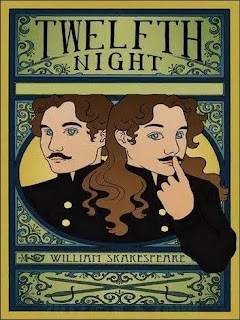VARIOUS KINDS OF LOVE IN TWELFTH NIGHT
‘As to the types of love represented by the characters in Twelfth Night the subject is inexhaustible, like the light and shadows of contrast…’ -Morton Luce
Twelfth Night is the play of which love is peculiarly the subject The very first speech of the Duke calling for music to feed the passion of love in him shows that love is the dominant part in the comedy Cupid in his freakishness makes his victims in this play and plays, as with toys, with Olivia, Sebastian, Viola, The Duke, even with Malvolio-who love the game yet suffer in it. Shakespeare has introduced all the different types and shades of love and the theme of love have been treated from all possible angles in the play.
The Duke is in love with love itself, and not with any creature of flesh and blood although he professes that he is in love with Olivia. His love for Olivia is love in idleness; he is always discussing it, feeling it in different ways and surroundings, and seems always as if he were at play with it. A tender poetic soul, the Duke’s sole business is to nurture this love with the most delicate and strongest ailments in his heart. His love is rather a production of his fancy than a genuine feeling. He sets up in imagination an ideal of his beloved, without sufficiently knowing her as a person. The affection of the heart resulting in emotional longing does not enter into his conception of love. It is plain that Olivia has only enchanted his imagination, not won his heart. Though he is not himself aware that such is the case and calls his love nobler than the world. Consequently, when the Duke finds Olivia placed beyond his hope, he feels no compunction in transferring his affections to the page now transformed into a beautiful girl. Some critics call his love hopeless love.
Olivia is another instance of the freakishness of the god of Love, In her, we find the quick flaming love which is more of the senses than of the soul. Although she has been wooed incessantly, she has turned a deaf ear to the Duke’s wooing, falls impulsively in love with the beautiful and witty Cesario in spite of her vow not to see any male face for at least seven years due to her grief for her deceased brother. Her sudden passion or rather fancy for the disguised page takes so beautiful a coloring a poetry and sentiment that neither wit nor reason can her passion hide. She herself calls her love ‘a most extracting frenzy.’ Then, by an immense good fortune, she finds Sebastian, the very image and mirror of Cesario With the same sudden speed with which she loved at first, she hurries on to her marriage.
The love of Viola presents a more difficult proposition because her love for the Duke is a matter of the heart and not simply o fancy. Stopford Brooke has rightly remarked, ‘Viola is the image of deep, true and imaginative love-love as a passion not of the senses but of the intellect and the soul.’ Love makes her selfless. She undertakes the mission of courting Olivia for the very man she loves with the utmost passion and earnestness. Her love is also honest and as deep as the sea and that is why she succeeds in winning the same person for her husband whom she loves in the very beginning. Her love, which is quite unchanging, offers a striking contrast to the inconstant but eloquent fancy of Orsino and to the impetuous passion of Olivia.
So far Malvolio’s love for Olivia is concerned, we turn to love in its grotesqueness, born not of the heart, nor even of the fancy, but of inflated – self-conceit. Thoroughly in love with his own excellences, he is easily led to believe that others are equally in love with them, a hint from the mischievous Maria encourages the idea that Olivia’s feeling for him is of a more tender kind than of a mistress for a faithful servant.
Sir Andrew Aguecheek, the fantastic fool, has also the presumption to be a suitor for Olivia’s hand and for this belief, Sir Toby extracts money from him. He is another person on whom the god of Love plays a cruel prank.
Maria, the smart waiting-maid, has an eye on Sir Toby Belch in order that her ambition to be made a ‘my lady’ may be fulfilled. With a ludicrous stroke in the drama, Sir Toby would marry Maria for the worth of her practical joke.
Orsino, Olivia, and Viola are believers in Romantic love. There is. however, another of love illustrated in the play, which deserves passing mention. Olivia and Viola are both fonds of their brothers. For seven years Olivia has chosen to live in the cloister to mourn her brother. Viola’s love for her brother, Sebastian, is equally strong and tender, although she does not make a display of it like Olivia.
Some subsequent critics have sought to prove that variable fancy is the fundamental element in the mental trait of all the characters in Twelfth Night. But this does not mean that Shakespeare considers the passion of love essentially ludicrous. Viola is Shakespeare’s ideal and she displays the noblest type of love. With her as with Shakespeare, love is the sommum bonum of civilizer of the world.
